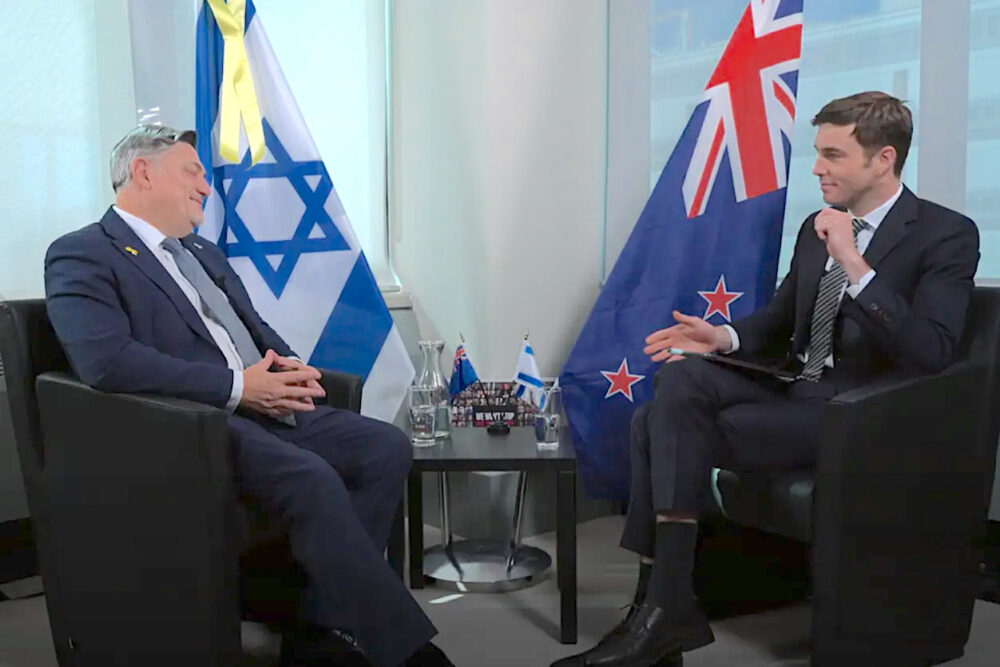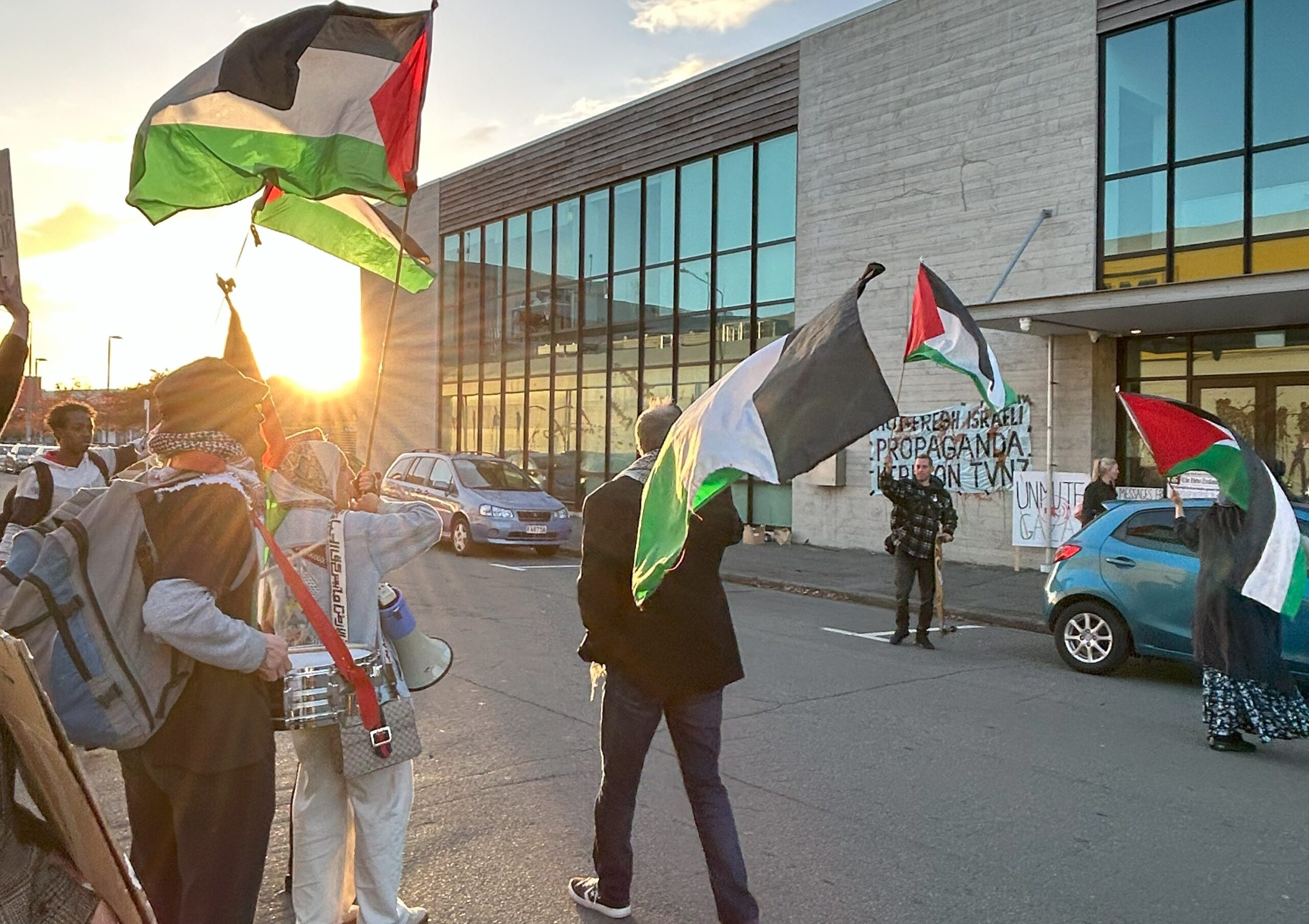An Israeli Ambassador & the Failure of Media
An Israeli Ambassador & the Failure of Media
New Zealand national broadcaster TVNZ had a chance to hold Israel’s ambassador to New Zealand to account. What transpired was hard to look at, writes Mick Hall.

Jack Tame (right) interviews Israel’s ambassador to New Zealand, Ran Yaakoby on TVNZ’s Q+A programme on Sunday, April 21. (Photo: TVNZ/Screenshot)
By Mick Hall
in Whangarei, New Zealand
Substack

When I first heard TVNZ’s Q+A with Jack Tame would feature an interview with Israel’s Ambassador to New Zealand Ran Yaakoby I gave the national broadcaster’s news leaders way too much credit.
As we face into a ground assault on Gaza’s southern city of Rafah, with over 34,000 officially dead, a military siege deliberately inducing famine and a mountain of evidence with the International Court of Justice (ICJ) pointing to Israel committing genocide, I suspected savvy editorial bosses had determined they better act now to claw back some credibility.
Because, for the last six months New Zealand’s media has ignored a preponderance of evidence that Israel’s ethnic cleansing of Gaza had devolved further into a full-blown genocidal onslaught, its largely U.S.-provided military machine ratcheted up, the gears well oiled by Western diplomacy, dehumanisation and widely-propagated lies.
While New Zealand media followed the lead of government in framing Israel’s actions as legitimate self-defence and an albeit brutal war against Hamas after its Oct. 7 attack, many of us had been consuming non-curated social media clips and statements by various individuals and organisations that rightly contradicted this messaging.
Ongoing atrocities have been making the official narrative much harder to sustain.
Surely news chiefs now knew they’d left themselves exposed and that something needed to be done to arrest the reputational damage would be inevitably follow, particularly after a recent academic survey that found trust in media in the country had already taken a major nose dive over recent years.
Not giving the Israeli ambassador any quarter during an interview over Gaza may help do so and suggest the broadcaster had done its bit in exposing Israeli lies and crimes, instead of being perceived as a mere informational cog in the Western war machine.
‘An Unmissable Conversation’
It was clear from the TVNZ introductory segment on April 21 that was not the way this interview was going to play out.
Basically, I’d made the mistake of assuming media bosses had adequate self-insight, empathy for Palestinians or any real understanding of what is unfolding in the Middle East.
Its website blurb also gave a decent clue of what was to come. It read:
“An unmissable conversation with Israel’s ambassador to New Zealand, about terrorism, the impact of war on civilians, and how this country should respond.”
Instead of pulling down the ideological architecture of media genocide complicity, Jack Tame left it standing. Some have argued the journalist, known for his combative style of questioning, had been ill-prepared. But it seems much more than that.
When it comes to reporting on the polarising issue of the Israel-Palestine conflict, news managers at national broadcasters like RNZ and TVNZ are afraid of their own shadows. As well as being grossly uninformed of the history and politics of the issue, these people are terrified of the Israeli lobby and political pushback, as the ABC firing of host Antoinette Lattouf demonstrates.
The net result is the imposition of a version of due impartiality vitiated by political consideration, careerism, group think and orthodoxy. News stories and programmes omit facts inconvenient to a type of safe editorial positioning that doesn’t contradict Western foreign policy settings.
News bosses here usually take their lead from international colleagues at the BBC, AP, CNN and Reuters, who are masters at doing this, republishing such content. Journalists who step outside this self-censoring framework do so at their own peril, something every journalist in New Zealand to date seems to have avoided.
Double standards and Bias

Palestine solidarity protesters picket outside the Christchurch offices of TVNZ on April 22, a day after the Q+A interview with Israeli ambassador to New Zealand Ran Yaakoby was broadcast. (Palestine Solidarity Network Otautahi)
Likewise, Tame stayed on message with his editorial superiors. Not only was he unable or unwilling to adequately push back against a second-rate Israeli propagandist, he was happy to engage in Western media platitudes and hypocrisy.
He repeatedly used terms like “barbaric” to describe Oct. 7, while not using the same condemnatory adjectives to describe Israel’s killing of Palestinian civilians. He agreed with the genocide-enabling view that Hamas used Palestinians as human shields, again calling it barbaric.
He never contradicted the widely discredited claims of widespread rape and other Oct. 7 disinformation employed to condition the public to fall in line with Israel’s military reaction.
Tame ignored international law when he characterised Palestinian armed resistance as “terrorism”. Palestinians’ right under occupation to violently resist is upheld under Additional Protocol I to the Geneva Conventions of 1949.
United Nations General Assembly (UNGA) resolutions have reaffirmed the right, including the 1982 resolution 3743, which upholds the “legitimacy of the struggle of peoples for independence, territorial integrity, national unity and liberation from colonial and foreign domination and foreign occupation by all available means, including armed struggle”.
Tame’s line of questioning was facile and misleading. In posing a philosophical question about whether it was morally correct to kill a Hamas operative alongside a child, he seemed to implicitly accept the assumption IDF soldiers were solely fighting a war against Hamas and not intentionally ethnic-cleansing Gazans, when the evidence strongly suggests otherwise.
Tame did not question Yaakoby on whether Israeli was committing ethnic cleansing, or whether Israel was an apartheid regime, in response to his assertion that Israel was a democracy.
Was Tame given explicit direction to avoid raising these questions? There is precedent in New Zealand for such self-censorship, with at least one incident at Radio New Zealand (RNZ) where claims of genocide made by a Palestinian guest last November were removed and not aired.
An Exercise in Propaganda
In any case, Tame must take responsibility for his interview. Unless trapped inside the same bubble as his bosses, he must surely be doing some soul-searching in light of significant social media criticism and numerous complaints now clogging up inboxes at TVNZ and New Zealand’s media watchdog.
If the intent of the interview wasn’t to break out of a discredited mainstream media narrative and win back some credibility amongst an increasingly distrusting public, what was it?
It is probable the interview was an attempt at scrutiny of Israel, but within the narrow parametres of Western liberal discourse. It did nothing to challenge the legitimacy of a “rules-based international order” that would allow a genocide against a captive population. It masked the colonial nature of the apartheid settler state and it avoided much-needed scrutiny of its ethnic-cleansing end game.
Tame also failed to push back on war-hawk narratives of Iran being a self-serving “puppet master”, pulling the strings of Hamas to sow chaos in the Middle East. Nor did he challenge Yaakoby’s ridiculously incoherent comments that Syria must be blamed in its failure to protect Iran’s diplomatic mission in Damascus and that in any case a military hub had been bombed next to the building, not the Iranian embassy proper.
The programme allowed the ambassador to urge New Zealand to “take sides” in an existential battle between the evil “monster” Iran with its “proxies” on one side and Israel and the West on the other, a statement TVNZ conveniently posted on social media when advertising its interview.
This should be considered particularly disturbing, given New Zealand’s increasing integration into Western military blocs and its military involvement targeting the Houthis in Yemen.
The interview ended up a crude exercise in propaganda, plain and simple and will likely add to the continuing decline in media trust.
Mick Hall is an independent journalist based in New Zealand. He is a former digital journalist at Radio New Zealand (RNZ) and former Australian Associated Press (AAP) staffer, having also written investigative stories for various newspapers, including the New Zealand Herald.
https://consortiumnews.com/2024/04/29/an-israeli-ambassador-the-failure-of-media/
- Get link
- X
- Other Apps

Comments
Post a Comment